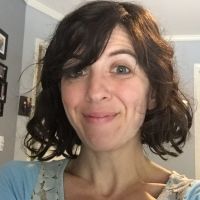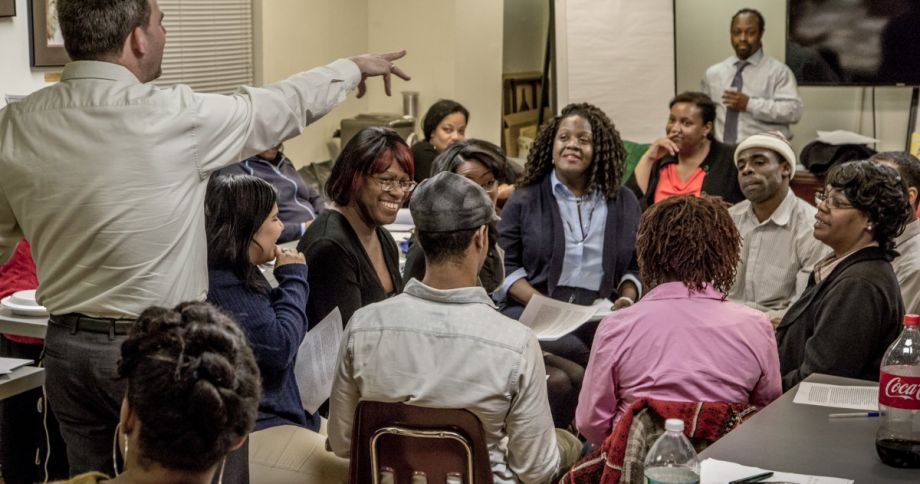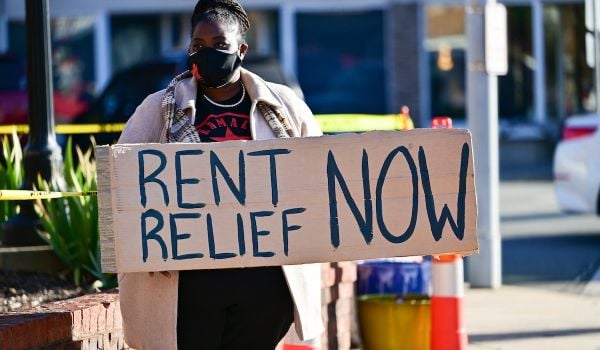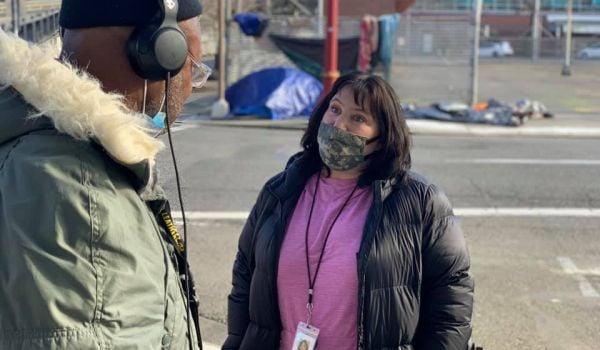Students enroll in a Clemente Course in the Humanities for all kinds of reasons.
Some start this rigorous, tuition-free academic program out of the desire to continue an education that was interrupted—whether by financial need, parenthood, homelessness, or any other number of events.
For others, it’s the opportunity to join a community of fellow motivated adult learners that’s so appealing. Maybe they want specifically to study classics of philosophy, literature, and art history, or perhaps they’re drawn to the intellectual freedom that the pursuit of humanities education affords.
Regardless of what brings students into a Clemente classroom, every one of them shares at least a couple important characteristics. First, they are extremely intellectually driven, and second, they are living in some level of economic distress, ranging from full-time workers making less than 200 percent of the federal poverty threshold, to those experiencing chronic homelessness and unemployment.
The beginnings of the Clemente Course in the Humanities
In 1995, a sociologist and poverty researcher named Earl Shorris founded the very first Clemente Course in the Humanities in New York at a counseling center for low-income people.
Shorris had conducted a great deal of research on poverty at that point, but the idea for the Clemente Course came out of one specific conversation he had with an incarcerated woman while conducting research for an upcoming book.
As related in a 1997 Harper’s article Shorris wrote about the founding of the program, that conversation began with his question, “Why do you think people are poor?” One woman, Niecie, responded, “You’ve got to teach the moral life of downtown to the children. And the way you do that, Earl, is by taking them downtown to plays, museums, concerts, lectures, where they can learn the moral life of downtown.”
Shorris came to agree. What Niecie was getting at was the central belief upon which Shorris built Clemente: That access to the study of humanities, specifically, with its emphasis on critical thought, discussion, and reflection, was a critical step in helping people permanently out of poverty.
The thinking is that, while jobs, housing, and money are, of course, vital in helping people improve their economic status, it’s that intellectual access that can give people the freedom and ability to participate in the political life of society—and thereby, to claim social and political power, which, by definition, is something that marginalized people do not have.
Importantly, in this case, “political” is meant in the way the Greek thinker Thucydides defined it: as activity and engagement with other people at every level of society, from neighbors to elected officials.
If this seems idealistic or impractical, it’s worth considering what Shorris told his very first room of potential Clemente recruits: Upper-class people receive this education early on. They study it at private schools and universities. Even today, the great canonical philosophers, writers, artists and historians are considered the property of the economic and cultural elite. And part of that is because that type of liberal education confers power upon those who have it.
Shorris’ idea started with one class of students in lower Manhattan and a few volunteer professors, thinkers, and writers from elite institutions in the city. Today, there are programs in 14 states across the U.S., and Clemente Course participants and alumni number in the ten thousands. The classes are full, college-level courses, with each program typically running three semesters, and most offer at least some college credit to graduates.
Because many in Clemente’s student population have additional needs that must be met in order to be able to complete the classes, Clemente programs typically offer additional resources like transportation vouchers, free childcare, and a meal. Many also partner with social service organizations, so they can refer those who need greater support to the right places.
Clemente in 2020: The Socratic Method on Zoom
“If there’s an image associated with the Clemente Course, it’s people seated around a circular table in conversation,” says Vivé Griffith, the director of outreach and engagement for Clemente Course in the Humanities, Inc.
So when the pandemic hit, there was real cause for concern among the faculty and program leaders about whether they could actually continue the courses that their students had begun in September.
“Clemente is so much about people coming into a space together—their kids go to the childcare room, there’s probably food, you’ve got your books,” Griffith says. “In the beginning, many people thought ‘I don’t know if I can really do this work in a virtual environment.’”
While faculty, all of whom are either current or retired college professors, were retreating into their homes to shelter in place, many of their students were heading out into a more dangerous world as essential workers. Many didn’t have reliable access to technology.
So, as it did for so many different organizations, the pandemic prompted a refocusing and reprioritization. Some programs, like the ones headed by Mass Humanities in Massachusetts, conducted a fundraiser to purchase Chromebooks and hotspots for their students. Others, like one in Savannah, Ga. conducted a used-technology drive to supply students with laptops.
As the pandemic continued, however, and as the racial justice and Black Lives Matter protests became more and more powerful in the spring and summer, many programs pivoted—not just to work around the technological limitations of implementing the Socratic Method on video conference, but to address the moment with greater immediacy.
One of those pivots was a summer op-ed writing course funded by Mass Humanities. The course culminated in an anthology of essays, We Too Are America, by students from four of the state’s Clemente programs, published by Mass Humanities and sold through the Harvard University bookstore. The book’s cover features an image of a quilted portrait of Langston Hughes, created by contributor and quilter Lesyslie Rackard.
Rackard, who is retired, graduated from the full Clemente course program in May of 2020, and wanted to continue her academic work through the summer. The writing program also gave her an opportunity to express the way she was experiencing the intensity of the Black Lives Matter protests, as a Black woman. “It gave us a voice,” she says of the program. “It helped us—not so much to understand what was going on, but to be able to speak about what was going on.”
Rackard and her classmates had spent the past semester’s history class studying the Declaration of Independence, Frederick Douglass, Nat Turner, and other aspects of history that, she says, were striking in their relevance to the moment. “We would read these things and say ‘Oh my goodness, this is here. This is now.’”
For her, the protests and the racial justice movement drove her not to the streets—“I left that to the young folks,” she says—but to her quilting fabric. It’s that activity that inspired her contribution to We, Too, Are America. “The piece that I wrote was ‘Quilts: The Reason to Keep Stitching,’” she says. The essay remarks on the intersection of quilting, a domestic and supposedly apolitical act, with political action.
“I read something a long time ago that said quilts don’t belong in a political environment—it belongs to those who just sit and sew and talk together, and these were quilters saying that,” Rackard says. “My focus on quilting was starting to change. I’d gone from the more traditional to more political. I was letting the cloth speak for me. And I wanted the reader to understand that quilting has been a social act, a political act, for a very long time.”
Several states over, at Chicago’s Odyssey Project, which is a Clemente Course funded by the nonprofit Illinois Humanities, students and faculty pivoted in a different direction. Rather than offer the typical year-and-a-half long full program for the 2020-21 academic year, staff and faculty decided to offer mini-courses that lasted three to six weeks.
90 percent of Odyssey students are people of color, and most of those are Black women. So the Black Lives Matter movement and the protests that were happening there in the city were hitting extremely close to home for many of them.
One participant in several of those mini-courses, as well as the one-session workshops and conversations that Odyssey also hosted in summer 2020 is Jacqueline Finley. She completed the traditional Odyssey program back in 2012, and since then has been involved in multiple projects around social justice and policing that Odyssey has co-hosted or been a part of with other community organizations.
For Finley, it’s the space to engage in meaningful, risky conversations that has made Clemente such an important part of her life. “The Odyssey Project and Illinois Humanities gives me a place where I feel safe to be able to address the things that are happening in our nation,” Finley says. “And these are not pretty conversations. They’re about racism, capitalism. I’m in a course right now about justice in the city, and we’re studying land and housing discrimination, the various practices at the state and federal level that have been barriers to Black homeownership. They are often about the darkness of humanity in America.”
Clemente Courses have always been about giving people those kinds of safe spaces—but the kind of safe space that is inextricably tied to true intellectual freedom and academic respect. “Everyone took something different from the course,” Rackard says of her time in the Clemente program. “But that was the place where we could come together and have a difference of opinion, but still respect everyone’s opinion. We left there calling each other scholars. And that was very special.”
Editor’s note: Due to an editing error, the caption for the photo mistakenly identified the class as taking place in the Bronx, when it is located in Harlem. We’ve corrected the error.

Elizabeth Pandolfi is a freelance arts and culture journalist. She is the former arts editor of the Charleston City Paper, and her work has appeared in Art and Antiques magazine, Charleston magazine, WNC magazine, and other publications.
















